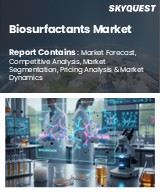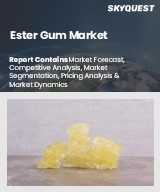
|
시장보고서
상품코드
1797009
트리아세틴 시장 : 산업 규모, 점유율, 동향, 기회, 예측 - 등급별, 제품 유형별, 최종 사용자별, 지역별, 경쟁별(2020-2030년)Triacetin Market - Global Industry Size, Share, Trends, Opportunity & Forecast, Segmented By Grade, By Product Type, By End User, By Region, & Competition, 2020-2030F |
||||||
세계의 트리아세틴 시장 규모는 2024년에 3억 4,265만 달러로 평가되었고, 2030년에는 4억 3,383만 달러에 이를 것으로 예측되며, CAGR 4.01%로 성장할 전망입니다.
세계의 트리아세틴 시장은 의약품, 가공식품, 화장품, 담배 제조, 특수화학제품 등의 주요 부문에 폭넓게 응용할 수 있는 것에 지지되어 일정한 성장을 계속하고 있습니다. 다기능 화합물인 트리아세틴(트리아세테이트 글리세릴)은 가소제, 용제, 보습제, 담체로서 탁월한 성능을 발휘하기 위해 캡슐 코팅, 츄잉껌 베이스, 향료 안정제, 담배 필터 로드 등의 대량 처방에서 중요한 첨가제가 되고 있습니다.
| 시장 개요 | |
|---|---|
| 예측 기간 | 2026-2030년 |
| 시장 규모(2024년) | 3억 4,265만 달러 |
| 시장 규모(2030년) | 4억 3,383만 달러 |
| CAGR(2025-2030년) | 4.01% |
| 급성장 부문 | 식품 등급 |
| 최대 시장 | 아시아태평양 |
시장의 확대는 엄격한 규제 클리어런스에 의해 더욱 강화되고 있으며, 엄격한 규제 산업에 원활하게 도입할 수 있습니다. 성분의 효율성, 제형의 다재다능성, 깨끗한 라벨 및 비독성 제품 표준을 준수하는 것을 선호하는 제조업체가 늘어나면서, 트리아세틴은 제품 혁신 파이프라인의 전략적 요소가 되고 있습니다. 레거시 제조 시스템 및 차세대 제제 모두에 통합할 수 있기 때문에 성숙 시장이나 신흥국 시장 모두 부가가치가 높은 기술적으로 준거한 제품 라인을 실현하는 중요한 툴로 자리매김하고 있습니다.
시장 성장 촉진요인
제약 산업에서 트리아세틴 사용 확대
주요 시장 과제
복잡한 규정
주요 시장 동향
기술 진보의 성장
목차
제1장 개요
제2장 조사 방법
제3장 주요 요약
제4장 고객의 목소리
제5장 트리아세틴 시장 전망
- 시장 규모 및 예측
- 금액 및 수량별
- 시장 점유율 및 예측
- 등급별(담배 등급, 식품 등급, 산업 등급)
- 제품 유형별(가소제, 용제, 보습제, 기타)
- 최종 사용자별(담배, 음식, 의약품, 화장품, 화학약품, 기타)
- 지역별
- 기업별(2024년)
- 시장 맵
제6장 북미의 트리아세틴 시장 전망
- 시장 규모 및 예측
- 시장 점유율 및 예측
- 북미 : 국가별 분석
- 미국
- 캐나다
- 멕시코
제7장 유럽의 트리아세틴 시장 전망
- 시장 규모 및 예측
- 시장 점유율 및 예측
- 유럽 : 국가별 분석
- 독일
- 영국
- 이탈리아
- 프랑스
- 스페인
제8장 아시아태평양의 트리아세틴 시장 전망
- 시장 규모 및 예측
- 시장 점유율 및 예측
- 아시아태평양 : 국가별 분석
- 중국
- 인도
- 일본
- 한국
- 호주
제9장 남미의 트리아세틴 시장 전망
- 시장 규모 및 예측
- 시장 점유율 및 예측
- 남미 : 국가별 분석
- 브라질
- 아르헨티나
- 콜롬비아
제10장 중동 및 아프리카의 트리아세틴 시장 전망
- 시장 규모 및 예측
- 시장 점유율 및 예측
- 중동 및 아프리카 : 국가별 분석
- 남아프리카
- 사우디아라비아
- 아랍에미리트(UAE)
제11장 시장 역학
- 성장 촉진요인
- 과제
제12장 시장 동향 및 발전
- 최근 동향
- 제품 출시
- 합병 및 인수
제13장 세계의 트리아세틴 시장 : SWOT 분석
제14장 경쟁 구도
- BASF SE
- DAICEL CORPORATION
- Eastman Chemical Company
- LANXESS AG
- Innova Global Limited
- POLYNT SPA
- Sisco Research Laboratories Pvt. Ltd.
- Spectrum Chemical Manufacturing Corp.
- WUXI KAILAI BIOTECHNOLOGY CO. LTD.
- Zhonglan Industry Co. Ltd.
제15장 전략적 제안
제16장 기업 소개 및 면책사항
AJY 25.08.29Global Triacetin market was valued at USD 342.65 Million in 2024 and is expected to reach USD 433.83 Million by 2030 with a CAGR of 4.01%. The global triacetin market is witnessing measured yet consistent growth, underpinned by its broad-spectrum applicability across key sectors such as pharmaceuticals, processed foods, cosmetics, tobacco manufacturing, and specialty chemicals. As a multifunctional compound, triacetin (glyceryl triacetate) offers exceptional performance as a plasticizer, solvent, humectant, and carrier, making it a critical additive in high-volume formulations including capsule coatings, chewing gum bases, fragrance stabilizers, and cigarette filter rods.
| Market Overview | |
|---|---|
| Forecast Period | 2026-2030 |
| Market Size 2024 | USD 342.65 Million |
| Market Size 2030 | USD 433.83 Million |
| CAGR 2025-2030 | 4.01% |
| Fastest Growing Segment | Food Grade |
| Largest Market | Asia-Pacific |
Market expansion is further supported by stringent regulatory clearances, enabling seamless adoption across highly regulated industries. With manufacturers increasingly prioritizing ingredient efficiency, formulation versatility, and compliance with clean-label or non-toxic product standards, triacetin is becoming a strategic component in product innovation pipelines. Its ability to integrate into both legacy manufacturing systems and next-generation formulations positions it as a key enabler of value-added, technically compliant product lines across mature and fast-developing markets alike.
Key Market Drivers
Growing Use of Triacetin in Pharmaceutical Industry
The pharmaceutical industry's increasing utilization of triacetin (glyceryl triacetate) is a major driver behind the growth of the global triacetin market. As a versatile, safe, and multifunctional compound, triacetin is extensively employed in drug formulation and delivery systems due to its favorable physicochemical properties, regulatory acceptance, and functional advantages. The rising demand for advanced drug formulations, combined with the global expansion of healthcare infrastructure, positions triacetin as a critical ingredient in pharmaceutical manufacturing. Triacetin is widely used as a plasticizer in pharmaceutical coatings, particularly for: Gelatin capsules (soft and hard), Tablet film coatings, Controlled-release and enteric-coated formulations. Its ability to enhance flexibility, mechanical strength, and film-forming properties makes it essential in protecting active pharmaceutical ingredients (APIs) from moisture, oxygen, and light. It also facilitates better swallowing, controlled drug release, and improved stability, which are increasingly prioritized in modern pharmaceutical products. Another critical use of triacetin in pharmaceuticals is as a carrier or solvent for lipophilic drugs, flavors, and active ingredients. Its excellent solubility characteristics and low toxicity make it ideal for use in: Transdermal patches, Injectables, Topical creams and ointments, Oral liquid suspensions. As the pharmaceutical industry shifts toward precision drug delivery and patient-centric dosage forms, triacetin's compatibility with advanced drug delivery technologies makes it highly valuable.
Triacetin holds regulatory approval from global health authorities, including: U.S. FDA (Generally Recognized as Safe - GRAS), European Pharmacopoeia, Japanese and Indian Pharmacopoeias. Its non-toxic, non-irritant, and biodegradable nature supports its use in a wide range of pharmaceutical products. This strong regulatory endorsement ensures high confidence among drug developers and manufacturers, driving consistent demand. The global pharmaceutical market is evolving rapidly due to increasing prevalence of chronic diseases, aging populations, and a growing emphasis on specialty drugs such as: Hormonal therapies, Antiretrovirals, Cardiovascular and oncology drugs, Neurological treatments. These drug classes often require precise delivery mechanisms, controlled-release systems, and protective coatings all of which benefit from the use of triacetin. As such, triacetin plays a supporting yet essential role in enabling the development of sophisticated and effective therapeutic solutions.
Key Market Challenges
Complexity in Regulations
One of the most prominent challenges affecting the global triacetin market is the ever-evolving landscape of regulations and standards across different industries. In the food and pharmaceutical sectors, where safety and quality are of utmost importance, strict regulations dictate the use of additives to ensure consumer protection. These regulations are put in place by various regulatory bodies such as the Food and Drug Administration (FDA) in the United States and the European Food Safety Authority (EFSA) in Europe, aiming to safeguard public health. Manufacturers in the triacetin industry must navigate this complex regulatory environment, constantly adapting to changing guidelines to ensure compliance. This process can be time-consuming and costly, as it requires thorough testing, documentation, and approval from regulatory authorities. Failure to comply with these regulations can result in significant consequences, including product recalls, fines, and damage to the brand reputation. In addition to complying with regulations, manufacturers also face the challenge of staying up to date with the latest scientific research and advancements in the field. New studies and findings may lead to changes in regulations and standards, requiring manufacturers to continuously monitor and evaluate their processes and formulations. This ongoing commitment to compliance and innovation is crucial for maintaining a competitive edge in the global triacetin market.
Key Market Trends
Growth in Technological Advancements
Technological advancements have brought about revolutionary changes in the manufacturing processes involved in the production of triacetin. Through the implementation of automation, robotics, and precision control systems, efficiency has been greatly improved, resulting in reduced production costs and an overall enhancement in the quality of triacetin. Moreover, the utilization of advanced manufacturing techniques, such as continuous flow reactors and advanced separation methods, has not only increased production capacities but also improved product consistency. In addition to these advancements, progress in packaging and delivery systems has opened up exciting new avenues for triacetin applications. The development of controlled-release systems and nanoencapsulation technologies has enabled targeted and sustained release of triacetin in various industries, including cosmetics, pharmaceuticals, and food products. Consequently, the effectiveness and stability of triacetin-based products have been significantly enhanced. Furthermore, technology-driven product innovations have expanded the applications of triacetin even further. With the continuous advancements in fields such as nanotechnology, biotechnology, and polymer chemistry, triacetin is now being utilized in novel ways, such as in the production of functional coatings, bio-based packaging materials, and drug delivery systems. These innovations not only broaden the market potential of triacetin but also contribute to sustainability efforts and the development of eco-friendly solutions.
Key Market Players
- BASF SE
- DAICEL CORPORATION
- Eastman Chemical Company
- LANXESS AG
- Innova Global Limited
- POLYNT S.P.A
- Sisco Research Laboratories Pvt. Ltd.
- Spectrum Chemical Manufacturing Corp.
- WUXI KAILAI BIOTECHNOLOGY CO. LTD.
- Zhonglan Industry Co. Ltd.
Report Scope:
In this report, the Global Triacetin Market has been segmented into the following categories, in addition to the industry trends which have also been detailed below:
Triacetin Market, By Grade:
- Tobacco Grade
- Food Grade
- Industrial Grade
Triacetin Market, By Product Type:
- Plasticizer
- Solvent
- Humectant
- Others
Triacetin Market, By End User:
- Tobacco
- Food & Beverage
- Pharmaceutical
- Cosmetic
- Chemical
- Others
Triacetin Market, By Region:
- North America
- United States
- Canada
- Mexico
- Europe
- France
- United Kingdom
- Italy
- Germany
- Spain
- Asia-Pacific
- China
- India
- Japan
- Australia
- South Korea
- South America
- Brazil
- Argentina
- Colombia
- Middle East & Africa
- South Africa
- Saudi Arabia
- UAE
Competitive Landscape
Company Profiles: Detailed analysis of the major companies present in the Global Triacetin Market.
Available Customizations:
Global Triacetin Market report with the given market data, TechSci Research offers customizations according to a company's specific needs. The following customization options are available for the report:
Company Information
- Detailed analysis and profiling of additional market players (up to five).
Table of Contents
1. Product Overview
- 1.1. Market Definition
- 1.2. Scope of the Market
- 1.2.1. Markets Covered
- 1.2.2. Years Considered for Study
- 1.2.3. Key Market Segmentations
2. Research Methodology
- 2.1. Objective of the Study
- 2.2. Baseline Methodology
- 2.3. Key Industry Partners
- 2.4. Major Association and Secondary Sources
- 2.5. Forecasting Methodology
- 2.6. Data Triangulation & Validation
- 2.7. Assumptions and Limitations
3. Executive Summary
- 3.1. Overview of the Market
- 3.2. Overview of Key Market Segmentations
- 3.3. Overview of Key Market Players
- 3.4. Overview of Key Regions/Countries
- 3.5. Overview of Market Drivers, Challenges, Trends
4. Voice of Customer
5. Triacetin Market Outlook
- 5.1. Market Size & Forecast
- 5.1.1. By Value & Volume
- 5.2. Market Share & Forecast
- 5.2.1. By Grade (Tobacco Grade, Food Grade, Industrial Grade)
- 5.2.2. By Product Type Type (Plasticizer, Solvent, Humectant, Others)
- 5.2.3. By End User (Tobacco, Food & Beverage, Pharmaceutical, Cosmetic, Chemical, Others)
- 5.2.4. By Region
- 5.2.5. By Company (2024)
- 5.3. Market Map
6. North America Triacetin Market Outlook
- 6.1. Market Size & Forecast
- 6.1.1. By Value & Volume
- 6.2. Market Share & Forecast
- 6.2.1. By Grade
- 6.2.2. By Product Type
- 6.2.3. By End User
- 6.2.4. By Country
- 6.3. North America: Country Analysis
- 6.3.1. United States Triacetin Market Outlook
- 6.3.1.1. Market Size & Forecast
- 6.3.1.1.1. By Value & Volume
- 6.3.1.2. Market Share & Forecast
- 6.3.1.2.1. By Grade
- 6.3.1.2.2. By Product Type
- 6.3.1.2.3. By End User
- 6.3.1.1. Market Size & Forecast
- 6.3.2. Canada Triacetin Market Outlook
- 6.3.2.1. Market Size & Forecast
- 6.3.2.1.1. By Value & Volume
- 6.3.2.2. Market Share & Forecast
- 6.3.2.2.1. By Grade
- 6.3.2.2.2. By Product Type
- 6.3.2.2.3. By End User
- 6.3.2.1. Market Size & Forecast
- 6.3.3. Mexico Triacetin Market Outlook
- 6.3.3.1. Market Size & Forecast
- 6.3.3.1.1. By Value & Volume
- 6.3.3.2. Market Share & Forecast
- 6.3.3.2.1. By Grade
- 6.3.3.2.2. By Product Type
- 6.3.3.2.3. By End User
- 6.3.3.1. Market Size & Forecast
- 6.3.1. United States Triacetin Market Outlook
7. Europe Triacetin Market Outlook
- 7.1. Market Size & Forecast
- 7.1.1. By Value & Volume
- 7.2. Market Share & Forecast
- 7.2.1. By Grade
- 7.2.2. By Product Type
- 7.2.3. By End User
- 7.2.4. By Country
- 7.3. Europe: Country Analysis
- 7.3.1. Germany Triacetin Market Outlook
- 7.3.1.1. Market Size & Forecast
- 7.3.1.1.1. By Value & Volume
- 7.3.1.2. Market Share & Forecast
- 7.3.1.2.1. By Grade
- 7.3.1.2.2. By Product Type
- 7.3.1.2.3. By End User
- 7.3.1.1. Market Size & Forecast
- 7.3.2. United Kingdom Triacetin Market Outlook
- 7.3.2.1. Market Size & Forecast
- 7.3.2.1.1. By Value & Volume
- 7.3.2.2. Market Share & Forecast
- 7.3.2.2.1. By Grade
- 7.3.2.2.2. By Product Type
- 7.3.2.2.3. By End User
- 7.3.2.1. Market Size & Forecast
- 7.3.3. Italy Triacetin Market Outlook
- 7.3.3.1. Market Size & Forecast
- 7.3.3.1.1. By Value & Volume
- 7.3.3.2. Market Share & Forecast
- 7.3.3.2.1. By Grade
- 7.3.3.2.2. By Product Type
- 7.3.3.2.3. By End User
- 7.3.3.1. Market Size & Forecast
- 7.3.4. France Triacetin Market Outlook
- 7.3.4.1. Market Size & Forecast
- 7.3.4.1.1. By Value & Volume
- 7.3.4.2. Market Share & Forecast
- 7.3.4.2.1. By Grade
- 7.3.4.2.2. By Product Type
- 7.3.4.2.3. By End User
- 7.3.4.1. Market Size & Forecast
- 7.3.5. Spain Triacetin Market Outlook
- 7.3.5.1. Market Size & Forecast
- 7.3.5.1.1. By Value & Volume
- 7.3.5.2. Market Share & Forecast
- 7.3.5.2.1. By Grade
- 7.3.5.2.2. By Product Type
- 7.3.5.2.3. By End User
- 7.3.5.1. Market Size & Forecast
- 7.3.1. Germany Triacetin Market Outlook
8. Asia-Pacific Triacetin Market Outlook
- 8.1. Market Size & Forecast
- 8.1.1. By Value & Volume
- 8.2. Market Share & Forecast
- 8.2.1. By Grade
- 8.2.2. By Product Type
- 8.2.3. By End User
- 8.2.4. By Country
- 8.3. Asia-Pacific: Country Analysis
- 8.3.1. China Triacetin Market Outlook
- 8.3.1.1. Market Size & Forecast
- 8.3.1.1.1. By Value & Volume
- 8.3.1.2. Market Share & Forecast
- 8.3.1.2.1. By Grade
- 8.3.1.2.2. By Product Type
- 8.3.1.2.3. By End User
- 8.3.1.1. Market Size & Forecast
- 8.3.2. India Triacetin Market Outlook
- 8.3.2.1. Market Size & Forecast
- 8.3.2.1.1. By Value & Volume
- 8.3.2.2. Market Share & Forecast
- 8.3.2.2.1. By Grade
- 8.3.2.2.2. By Product Type
- 8.3.2.2.3. By End User
- 8.3.2.1. Market Size & Forecast
- 8.3.3. Japan Triacetin Market Outlook
- 8.3.3.1. Market Size & Forecast
- 8.3.3.1.1. By Value & Volume
- 8.3.3.2. Market Share & Forecast
- 8.3.3.2.1. By Grade
- 8.3.3.2.2. By Product Type
- 8.3.3.2.3. By End User
- 8.3.3.1. Market Size & Forecast
- 8.3.4. South Korea Triacetin Market Outlook
- 8.3.4.1. Market Size & Forecast
- 8.3.4.1.1. By Value & Volume
- 8.3.4.2. Market Share & Forecast
- 8.3.4.2.1. By Grade
- 8.3.4.2.2. By Product Type
- 8.3.4.2.3. By End User
- 8.3.4.1. Market Size & Forecast
- 8.3.5. Australia Triacetin Market Outlook
- 8.3.5.1. Market Size & Forecast
- 8.3.5.1.1. By Value & Volume
- 8.3.5.2. Market Share & Forecast
- 8.3.5.2.1. By Grade
- 8.3.5.2.2. By Product Type
- 8.3.5.2.3. By End User
- 8.3.5.1. Market Size & Forecast
- 8.3.1. China Triacetin Market Outlook
9. South America Triacetin Market Outlook
- 9.1. Market Size & Forecast
- 9.1.1. By Value & Volume
- 9.2. Market Share & Forecast
- 9.2.1. By Grade
- 9.2.2. By Product Type
- 9.2.3. By End User
- 9.2.4. By Country
- 9.3. South America: Country Analysis
- 9.3.1. Brazil Triacetin Market Outlook
- 9.3.1.1. Market Size & Forecast
- 9.3.1.1.1. By Value & Volume
- 9.3.1.2. Market Share & Forecast
- 9.3.1.2.1. By Grade
- 9.3.1.2.2. By Product Type
- 9.3.1.2.3. By End User
- 9.3.1.1. Market Size & Forecast
- 9.3.2. Argentina Triacetin Market Outlook
- 9.3.2.1. Market Size & Forecast
- 9.3.2.1.1. By Value & Volume
- 9.3.2.2. Market Share & Forecast
- 9.3.2.2.1. By Grade
- 9.3.2.2.2. By Product Type
- 9.3.2.2.3. By End User
- 9.3.2.1. Market Size & Forecast
- 9.3.3. Colombia Triacetin Market Outlook
- 9.3.3.1. Market Size & Forecast
- 9.3.3.1.1. By Value & Volume
- 9.3.3.2. Market Share & Forecast
- 9.3.3.2.1. By Grade
- 9.3.3.2.2. By Product Type
- 9.3.3.2.3. By End User
- 9.3.3.1. Market Size & Forecast
- 9.3.1. Brazil Triacetin Market Outlook
10. Middle East and Africa Triacetin Market Outlook
- 10.1. Market Size & Forecast
- 10.1.1. By Value & Volume
- 10.2. Market Share & Forecast
- 10.2.1. By Grade
- 10.2.2. By Product Type
- 10.2.3. By End User
- 10.2.4. By Country
- 10.3. MEA: Country Analysis
- 10.3.1. South Africa Triacetin Market Outlook
- 10.3.1.1. Market Size & Forecast
- 10.3.1.1.1. By Value & Volume
- 10.3.1.2. Market Share & Forecast
- 10.3.1.2.1. By Grade
- 10.3.1.2.2. By Product Type
- 10.3.1.2.3. By End User
- 10.3.1.1. Market Size & Forecast
- 10.3.2. Saudi Arabia Triacetin Market Outlook
- 10.3.2.1. Market Size & Forecast
- 10.3.2.1.1. By Value & Volume
- 10.3.2.2. Market Share & Forecast
- 10.3.2.2.1. By Grade
- 10.3.2.2.2. By Product Type
- 10.3.2.2.3. By End User
- 10.3.2.1. Market Size & Forecast
- 10.3.3. UAE Triacetin Market Outlook
- 10.3.3.1. Market Size & Forecast
- 10.3.3.1.1. By Value & Volume
- 10.3.3.2. Market Share & Forecast
- 10.3.3.2.1. By Grade
- 10.3.3.2.2. By Product Type
- 10.3.3.2.3. By End User
- 10.3.3.1. Market Size & Forecast
- 10.3.1. South Africa Triacetin Market Outlook
11. Market Dynamics
- 11.1. Drivers
- 11.2. Challenges
12. Market Trends & Developments
- 12.1. Recent Developments
- 12.2. Product Launches
- 12.3. Mergers & Acquisitions
13. Global Triacetin Market: SWOT Analysis
14. Competitive Landscape
- 14.1. BASF SE
- 14.1.1. Business Overview
- 14.1.2. Product & Service Offerings
- 14.1.3. Recent Developments
- 14.1.4. Financials (If Listed)
- 14.1.5. Key Personnel
- 14.1.6. SWOT Analysis
- 14.2. DAICEL CORPORATION
- 14.3. Eastman Chemical Company
- 14.4. LANXESS AG
- 14.5. Innova Global Limited
- 14.6. POLYNT S.P.A
- 14.7. Sisco Research Laboratories Pvt. Ltd.
- 14.8. Spectrum Chemical Manufacturing Corp.
- 14.9. WUXI KAILAI BIOTECHNOLOGY CO. LTD.
- 14.10.Zhonglan Industry Co. Ltd.
15. Strategic Recommendations
16. About Us & Disclaimer
(주말 및 공휴일 제외)


















